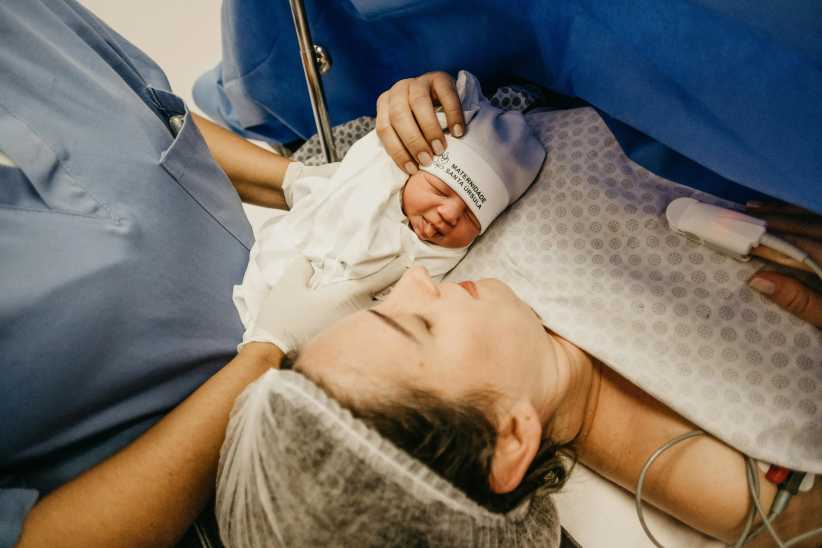
When you’re expecting, there’s so much to focus on: Clothes, furniture, getting your house ready. So much, in fact, that mothers often forget about something even more pressing: The childbirth itself. While hospital birth is still the standard for most delivering moms, there are all kinds of options to consider before you’re ready to give birth.
“Who we choose as a care provider is going to have a massive effect on how the birth unfolds, and we really need to encourage women to spend time, even before they’re pregnant, sitting down and saying ‘What kind of support do I want? Where do I feel safest? Who do I want at my birth?’” says Debra Flashenberg, doula and founder of the Prenatal Yoga Center. “‘Do I need a care provider that’s really going to make this a group effort, include me as the pregnant laboring woman, or do I want to let someone [else] call the shots?’”
We drafted this primer that details everything available to you, from support staff to birth locations.
Doulas
Doulas aren’t designated to work in a certain location: They can attend home or hospital births. “Hiring a doula means you’re hiring a birth attendant to help you with the discomforts and anxieties of labor and birth,” says Lizabeth Baker-Wade, a labor and delivery nurse, RN, and the owner of Birth & Beyond. In this sense, doulas are a support system in addition to whatever birth method you’ve chosen, a figure in the room focused on the mother’s state.
In a hospital, “the most shocking thing [for new parents] is how often people are left alone in labor without supportive care,” says Jada Shapiro, founder of Birth Day Presence, a top doula and childbirth education center, and boober, where new parents can go for on-demand, in-person, same-day lactation support. “That’s why so many people today are turning to birth doulas, because a birth doula is the only childbirth professional who is there with the parents from early labor to a couple hours after the birth of the child.”
At the same time, it’s important to remember that doulas don’t have to be certified—though many certified nurses have worked as doulas, and there are certification programs for doulas through Doulas of North America (DONA) and Childbirth and Postpartum Professional Association (CAPPA)—and as such, it’s important to consider how much their educational experience means to you versus experiential experience (attending various births with another doula).
Midwives
Where a doula is comparable to a birthing coach, a midwife is often seen more so as a medical professional. Midwives can deliver babies at home, in birthing centers, or even in hospitals. Often midwives are on hospital staffs. One thing to be aware of, though, cautions Dr. William Schweizer, an OB-GYN at NYU Langone, is the midwife’s degree of experience. He says some “don’t necessarily always have licensing and training. Some can be very good, of course and I think that’s really kind of what should be thought about: The credentials of the person you’re dealing with.”
Baker-Wade agrees: “If you deliver at home, then you can be with a certified nurse midwife or a licensed midwife,” she says. “Those are two midwifery programs: One requires a master’s degree in nursing and then midwifery, and one, you can be a layperson and be licensed through the state. And those people can do births in a birthing center or in somebody’s living room.”
Home Birth
Despite what you may believe, only about 2 percent of Americans have a home birth, according to Schweizer. What’s most important to keep in mind, he cautions, is the relative risk a mother-to-be poses. If she has a medical condition like a cardiac issue or even asthma, it may be unwise to attempt a home birth. Also to be considered: What if she decides she wants an epidural? Is someone in the room (hopefully, a midwife or doula) prepared to resuscitate the baby if need be? Is there a hospital plan should something go wrong?
Schweizer says that while the above are all important considerations, he does believe that for some “there are benefits to delivering at home: You’re within your own environment, you can incorporate as many family and friends as you want in the experience. A hospital birth does give you some protection in the event of a complication, but it doesn’t mean that all complications that might ensue in a hospital couldn’t be handled at home also.”
An added consideration is that home births might empower the mother; she can eat what she wants, give birth in whatever position she wants, and choose exactly who is around her in a chosen space. “The home birth environment is really for a family that truly wants to have as much kind of control over the birthing environment as possible, that truly believes that an un-medicated birth at home is the safest option for them,” Shapiro says.
Hospital Birth
Any woman whose birth may prove risky—whether due to previous health conditions, being post-term, or for other medical reasons—would be advised to give birth in a hospital for her and her baby’s safety. “If there is any doubt for you about a home birth, it’s not going to feel like the safest environment,” Shapiro says. “If you want to be in a much more medical environment, then you know a hospital birth is going to be more appropriate.”
Although hospital staff is able to administer medication and assist in an emergency, there are downsides as well. “Research shows that full-time fetal monitoring is not advantageous for the mom and baby,” Flashenberg says. “It can actually have some negative cascade effects.” There’s also far more personnel changes; you could be assisted by several rotating nurses, and it’s likely your doctor won’t be present for most of the labor process.
Birth Centers
The biggest concern regarding birth centers is their actual availability; depending on where you live, there may be only a few (if any) available, and it’s quite possible that either none will meet your needs or requirements, or they’ll just be overbooked. But if there is a perfect birth center nearby, many moms feel they provide the perfect middle ground between a home birth and a hospital birth. “I’ve worked with other women that feel they want all the bells and whistles [at a hospital] and should anything happen, they want to be right there,” Flashenberg says, “And then I’ve had some women feel, ‘I don’t want the bells and whistles, but I want to have access to it.’” Those women who want that sense of medical security but don’t care for the hospital atmosphere often choose a birth center.
Birth centers are also go-to spots for women who want to give birth in water. “Birthing centers typically have birthing tubs or laboring tubs, depending on the place,” Shapiro says. “Submersion in water is one of the most effective pain relief tools that you can use during labor.”























